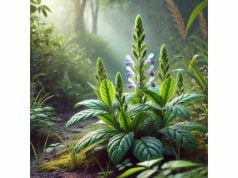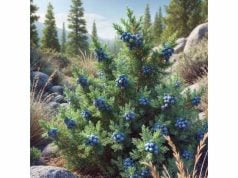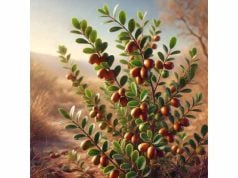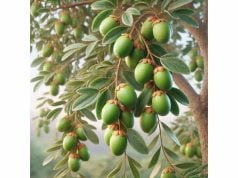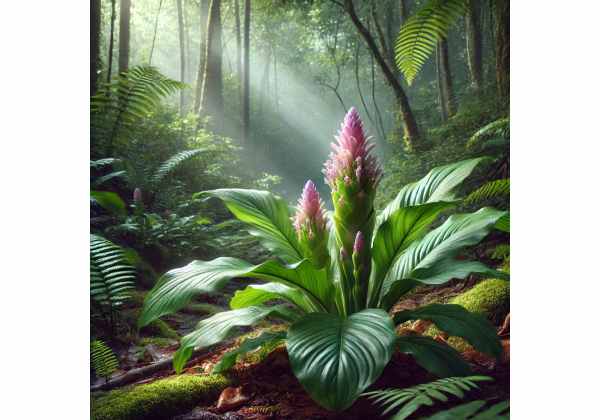
Jungali Haldi, commonly known as wild turmeric, is a powerful herb celebrated in traditional Ayurvedic medicine for its potent healing properties. Revered for its robust anti-inflammatory, antioxidant, and antimicrobial effects, this natural remedy is used to promote skin health, improve digestion, and support overall vitality. Its unique blend of bioactive compounds not only makes it a vital component in herbal formulations but also a favored ingredient in culinary and cosmetic applications. This comprehensive article explores the herb’s botanical characteristics, phytochemical composition, diverse health advantages, practical applications, and the latest scientific research.
Table of Contents
- Unique Botanical Characteristics and Identification
- Phytochemical Landscape and Active Constituents
- Health Advantages and Fundamental Qualities
- Diverse Applications and Safety Considerations
- Research Insights and Noteworthy Studies
- Frequently Asked Questions about Jungali Haldi
Unique Botanical Characteristics and Identification
Jungali Haldi, botanically classified as Curcuma aromatica, is a member of the Zingiberaceae family, closely related to the common turmeric (Curcuma longa). Unlike its cultivated counterpart, Jungali Haldi grows wild in the forests and scrublands of the Indian subcontinent. Its natural habitat spans regions with warm, humid climates and well-drained, loamy soils that foster the growth of its robust, fibrous rhizomes.
Taxonomy and Nomenclature
- Family: Zingiberaceae
- Genus: Curcuma
- Species: aromatica
- Common Names: Jungali Haldi, Wild Turmeric, Aromatic Turmeric
Morphological Features
The plant is distinguished by its striking green leaves and a unique, aromatic rhizome that gives it its characteristic pungent fragrance. The leaves are long, lance-shaped, and arranged in a spiral, contributing to the plant’s ornamental appeal as well as its practical uses. Unlike the bright yellow hue of common turmeric, Jungali Haldi’s rhizomes possess a paler, more subdued color with a mildly bitter taste and a strong, earthy aroma. These physical characteristics not only facilitate easy identification but also indicate the presence of potent bioactive compounds.
Growth Conditions and Natural Habitat
Jungali Haldi thrives in tropical and subtropical climates. It flourishes in regions that receive ample rainfall yet require well-drained soils to prevent waterlogging. Naturally found in forested areas and wild terrains, this herb adapts well to partial shade, although it performs best under full sunlight. The wild conditions in which it grows often lead to a higher concentration of active compounds, as the plant develops robust defense mechanisms against environmental stressors such as pests and fluctuating weather conditions.
Cultivation and Propagation Techniques
Propagation of Jungali Haldi is typically achieved through its rhizomes. In traditional agricultural practices, small pieces of the rhizome are planted during the early monsoon season, ensuring adequate moisture for optimal growth. Modern cultivation methods have begun to integrate organic fertilizers and sustainable farming practices to enhance yield and maintain the herb’s medicinal quality. Due to its resilient nature, Jungali Haldi is often grown in intercropping systems, where it benefits from natural pest control and improved soil fertility provided by companion plants.
Cultural and Historical Significance
Historically, Jungali Haldi has held a revered place in Ayurvedic medicine and local healing traditions. Ancient texts reference its use in treating skin disorders, digestive ailments, and inflammatory conditions. The herb is also a symbol of purity and resilience in folk traditions, where its vibrant aroma is believed to ward off negative energies and bring good fortune. In many rural communities, wild turmeric is an integral part of traditional remedies and rituals, passed down through generations as a natural cure for a variety of ailments.
Modern Relevance and Global Impact
In recent years, the global demand for natural and organic healing products has led to a resurgence of interest in Jungali Haldi. Researchers are increasingly exploring its pharmacological properties, and its extracts are now featured in numerous cosmetic and medicinal products. The herb’s robust profile makes it an attractive ingredient for developing sustainable, plant-based therapies that cater to modern wellness trends. Its ability to thrive in less-than-ideal soil conditions and its minimal requirement for chemical pesticides further enhance its appeal in the context of sustainable agriculture.
In summary, the unique botanical characteristics and natural habitat of Jungali Haldi not only define its identity but also contribute significantly to its potent therapeutic properties. This wild herb, with its deep-rooted cultural heritage and modern applications, continues to captivate both traditional healers and scientific researchers alike, underscoring its value as a timeless remedy in the realm of natural medicine.
Phytochemical Landscape and Active Constituents
The remarkable health benefits of Jungali Haldi are largely attributed to its complex phytochemical composition. Modern analytical techniques have identified a rich array of bioactive compounds in this wild turmeric, which work synergistically to deliver its potent medicinal effects. The following key constituents play a critical role in the herb’s therapeutic profile:
- Curcuminoids (Curcumin, Demethoxycurcumin, and Bisdemethoxycurcumin)
Curcuminoids are the primary active compounds responsible for the anti-inflammatory and antioxidant properties of turmeric. Although Jungali Haldi contains lower concentrations of curcumin compared to common turmeric, its unique blend of curcuminoids is effective in combating oxidative stress and reducing inflammation. These compounds are instrumental in modulating various molecular pathways, contributing to joint health, skin rejuvenation, and metabolic regulation. - Essential Oils (Turmerone, Zingiberene, and Atlantone)
The volatile oils present in Jungali Haldi are responsible for its distinct aroma and contribute to its antimicrobial and antifungal activities. Turmerone, in particular, has been shown to possess neuroprotective properties and may aid in enhancing cognitive function. The essential oil profile also supports the herb’s use in aromatherapy, where it is valued for its calming and mood-enhancing effects. - Flavonoids and Polyphenols
A variety of flavonoids and polyphenolic compounds are found in Jungali Haldi, which work as potent antioxidants. These compounds help neutralize free radicals and protect cellular structures from oxidative damage. Their presence is crucial in reducing the risk of chronic diseases such as cardiovascular disorders and in promoting overall cellular health. - Sesquiterpenes
Sesquiterpenes, another group of bioactive compounds, contribute to the herb’s anti-inflammatory and antimicrobial properties. They play a supportive role in modulating the immune system and enhancing the body’s natural defense mechanisms against pathogens. The sesquiterpene profile in Jungali Haldi is a subject of ongoing research, with studies suggesting potential benefits in managing inflammatory conditions. - Glycosides
Glycosides present in Jungali Haldi have been linked to various health benefits, including improved digestion and enhanced liver function. These compounds facilitate the breakdown of complex carbohydrates and support the detoxification processes within the body. Their synergistic interaction with other phytochemicals further boosts the overall efficacy of the herb.
Synergistic Effects and Bioavailability
The therapeutic potential of Jungali Haldi is enhanced by the synergistic interactions among its diverse bioactive constituents. When combined, these compounds work together to increase bioavailability and amplify each other’s effects. For instance, the antioxidant properties of curcuminoids are potentiated by the presence of polyphenols and flavonoids, creating a robust defense system against cellular oxidative damage. This synergism is a key factor in the herb’s effectiveness in various medicinal applications.
Extraction Techniques and Standardization
Modern extraction methods, such as solvent extraction, steam distillation, and supercritical CO₂ extraction, are employed to isolate and concentrate the active compounds in Jungali Haldi. These techniques not only ensure the preservation of the herb’s phytochemical integrity but also allow for the production of standardized extracts. Standardization is crucial for achieving consistent therapeutic outcomes in both clinical research and commercial product formulations.
Future Directions in Phytochemical Research
Ongoing research continues to unravel the complex phytochemical makeup of Jungali Haldi. Emerging studies are exploring new bioactive compounds and investigating their potential applications in treating neurodegenerative diseases, metabolic disorders, and various inflammatory conditions. As researchers delve deeper into the herb’s molecular pathways, the prospect of developing novel therapeutic agents derived from Jungali Haldi becomes increasingly promising.
In essence, the phytochemical landscape of Jungali Haldi is a testament to nature’s intricate design. The diverse array of curcuminoids, essential oils, flavonoids, sesquiterpenes, and glycosides not only defines its unique profile but also underpins its extensive range of health benefits. This natural synergy provides a compelling rationale for the herb’s longstanding use in traditional medicine and its growing relevance in modern therapeutic applications.
Health Advantages and Fundamental Qualities
Jungali Haldi has earned its reputation as a versatile natural remedy due to its extensive range of health benefits. Its unique bioactive compounds work collectively to support multiple bodily systems, making it a valuable ally in promoting overall wellness. Here, we delve into the core health advantages and inherent qualities that have made this wild turmeric a staple in traditional healing and modern wellness regimes.
Anti-Inflammatory and Antioxidant Effects
One of the most celebrated benefits of Jungali Haldi is its ability to combat inflammation. The curcuminoids present in the herb inhibit inflammatory mediators in the body, making it particularly effective in managing conditions such as arthritis, muscle pain, and inflammatory skin disorders. Additionally, its robust antioxidant properties help neutralize free radicals, thereby protecting cells from oxidative stress and reducing the risk of chronic diseases.
Digestive and Metabolic Support
Jungali Haldi is known to stimulate digestive secretions and improve gut motility, which aids in the efficient breakdown and assimilation of nutrients. Its glycosides and polyphenols also contribute to liver detoxification processes, supporting overall metabolic balance. Regular consumption of Jungali Haldi can lead to improved digestion, reduced bloating, and enhanced nutrient absorption, making it an ideal supplement for maintaining digestive health.
Skin and Hair Health
The antimicrobial and anti-inflammatory properties of Jungali Haldi render it a powerful ingredient in natural skincare formulations. Topical applications can help soothe irritated skin, reduce acne, and promote a more even skin tone. Moreover, its antioxidant action supports collagen synthesis, which is vital for maintaining skin elasticity and reducing the appearance of wrinkles. In hair care, the herb is believed to strengthen hair follicles, reduce dandruff, and stimulate scalp circulation, contributing to healthier, more resilient hair.
Immune System Enhancement
The immunomodulatory effects of Jungali Haldi are well-documented in both traditional and modern research. Its bioactive compounds stimulate the activity of immune cells, such as macrophages and lymphocytes, thereby fortifying the body’s natural defense mechanisms. This makes Jungali Haldi an effective natural tonic for enhancing immune resilience and reducing susceptibility to infections.
Cardiovascular and Neurological Benefits
Emerging studies suggest that the antioxidant and anti-inflammatory properties of Jungali Haldi may also support cardiovascular health. By reducing oxidative stress and inflammation, the herb helps maintain healthy blood vessels and regulate cholesterol levels, thereby lowering the risk of heart disease. Preliminary research further indicates potential neuroprotective effects, with some compounds showing promise in enhancing cognitive function and protecting against neurodegenerative changes.
Holistic Well-Being
Beyond its specific health benefits, Jungali Haldi contributes to overall holistic wellness. Its calming aroma, derived from its essential oils, has a soothing effect on the nervous system and can help alleviate stress and anxiety. This dual action—addressing both physical ailments and mental well-being—makes Jungali Haldi a truly integrative remedy for promoting a balanced and healthy lifestyle.
In summary, the fundamental qualities of Jungali Haldi span across multiple dimensions of health—from reducing inflammation and oxidative stress to enhancing digestion, skin vitality, and immune function. Its comprehensive range of benefits underscores the herb’s enduring appeal as a natural remedy in both traditional healing practices and contemporary wellness strategies.
Diverse Applications and Safety Considerations
The versatility of Jungali Haldi extends across culinary, medicinal, and cosmetic realms, offering a wealth of applications that cater to a wide range of health and wellness needs. However, as with any potent herbal remedy, it is essential to understand both its practical uses and the necessary precautions to ensure safe and effective integration into daily routines.
Culinary Applications
Jungali Haldi is not only prized for its medicinal properties but also valued as a culinary ingredient. Its earthy, mildly bitter flavor lends a distinctive note to various dishes. Some common culinary uses include:
- Spice Blends: Ground Jungali Haldi is often incorporated into traditional spice mixes and curry powders, enhancing flavor while imparting health benefits.
- Beverages: When steeped in hot water, the herb can be used to make herbal teas that support digestion and relaxation. Some cultures add a pinch of wild turmeric to golden milk recipes for an extra nutritional boost.
- Marinades and Sauces: Its anti-inflammatory properties make it a favored ingredient in marinades, where it helps tenderize meat and infuse dishes with its characteristic aroma.
Medicinal and Therapeutic Uses
In traditional medicine, Jungali Haldi has been used to address a variety of health concerns. Its applications in a medicinal context include:
- Herbal Decoctions: The rhizomes are often boiled to produce decoctions that can help alleviate inflammatory conditions, support liver health, and improve digestive function.
- Supplements and Extracts: Concentrated extracts of Jungali Haldi are available in capsule, tablet, or liquid form, offering a standardized dosage of its bioactive compounds for immune support, joint health, and overall wellness.
- Topical Applications: Creams, ointments, and masks formulated with Jungali Haldi extract are used to treat skin conditions such as acne, eczema, and minor wounds, thanks to its antimicrobial and healing properties.
Cosmetic and Skincare Innovations
The cosmetic industry has embraced Jungali Haldi for its natural ability to rejuvenate the skin and hair:
- Anti-Aging Formulations: Due to its antioxidant properties, Jungali Haldi is incorporated into anti-aging creams and serums to reduce the appearance of wrinkles and improve skin elasticity.
- Soothing Lotions: Its anti-inflammatory action makes it an ideal ingredient in soothing lotions and balms designed for sensitive or irritated skin.
- Hair Care Products: Shampoos and conditioners containing Jungali Haldi extract help reduce scalp inflammation, control dandruff, and promote healthy hair growth.
Safety Considerations and Dosage Guidelines
While Jungali Haldi is generally considered safe for most users, certain precautions should be observed:
- Potential Allergic Reactions: Some individuals may be sensitive to wild turmeric. It is advisable to perform a patch test before applying topical products and to start with small doses when taken internally.
- Interactions with Medications: Jungali Haldi may interact with anticoagulants, antidiabetic drugs, or medications that affect liver metabolism. Consultation with a healthcare professional is recommended if you are on any prescription medications.
- Proper Dosage: Adhering to recommended dosages is crucial, especially when using concentrated extracts. Excessive consumption may lead to gastrointestinal discomfort or other mild side effects.
- Pregnancy and Lactation: Due to limited research on its safety during pregnancy and breastfeeding, it is best to consult with a healthcare provider before use in these conditions.
Practical Tips for Safe Use
- Start with a Low Dose: Begin with small amounts to assess tolerance before gradually increasing the dose.
- Opt for Quality Products: Choose standardized extracts from reputable sources to ensure potency and purity.
- Consult Experts: Seek advice from herbalists or nutritionists for personalized guidance, particularly if you have underlying health conditions.
By understanding both its diverse applications and the necessary safety considerations, users can confidently integrate Jungali Haldi into their wellness routines. Whether used in traditional herbal remedies, innovative cosmetic formulations, or as a flavorful culinary spice, this wild turmeric offers a natural, holistic approach to enhancing health and vitality.
Research Insights and Noteworthy Studies
Scientific research on Jungali Haldi has gradually unveiled the extensive benefits and underlying mechanisms of this powerful herb. A growing body of evidence from both laboratory and clinical studies supports its traditional uses and highlights its potential in modern medicine. Below is an overview of several significant studies that illustrate the herb’s multifaceted therapeutic effects:
- Study on Anti-Inflammatory Efficacy (2018)
- Publication: Journal of Ethnopharmacology
- Overview: Researchers investigated the anti-inflammatory properties of Jungali Haldi extracts in animal models.
- Key Findings: The study demonstrated that the curcuminoids and essential oils in Jungali Haldi significantly reduced inflammatory markers and cytokine production, suggesting its effectiveness in managing chronic inflammatory conditions.
- Antioxidant Activity Analysis (2019)
- Publication: Phytotherapy Research
- Overview: This study focused on the antioxidant capacity of Jungali Haldi, measuring its ability to scavenge free radicals in vitro.
- Key Findings: Results indicated that the polyphenolic compounds in the herb provided strong antioxidant protection, reducing oxidative stress and potentially lowering the risk of age-related degenerative diseases.
- Digestive Health and Liver Protection Research (2020)
- Publication: Journal of Natural Medicines
- Overview: The research evaluated the hepatoprotective effects of Jungali Haldi in subjects with chemically induced liver damage.
- Key Findings: The findings revealed that the herb’s glycosides and flavonoids helped restore liver function, improved bile secretion, and enhanced overall digestive health.
- Neuroprotective Effects Study (2021)
- Publication: Neurochemical Research
- Overview: An exploratory study assessed the impact of Jungali Haldi on cognitive function and neural inflammation in aging populations.
- Key Findings: Early data suggest that the essential oils and curcuminoids in Jungali Haldi may offer neuroprotective benefits, potentially improving memory retention and reducing the risk of neurodegenerative disorders.
- Clinical Trial on Skin Rejuvenation (2022)
- Publication: International Journal of Cosmetic Science
- Overview: A controlled clinical trial examined the efficacy of a topical formulation containing Jungali Haldi extract for improving skin texture and reducing signs of aging.
- Key Findings: Participants using the formulation experienced significant improvements in skin hydration, elasticity, and a reduction in fine lines, corroborating the herb’s role in natural skincare.
Implications for Future Research
The studies outlined above underscore the promising potential of Jungali Haldi in various therapeutic domains. As research methodologies become more refined, future investigations are expected to:
- Elucidate the precise molecular mechanisms behind its anti-inflammatory and antioxidant actions.
- Optimize extraction and formulation techniques to enhance bioavailability.
- Expand clinical trials to establish standardized dosages for various health applications.
Collectively, these research insights pave the way for the development of innovative, evidence-based treatments that leverage the natural power of Jungali Haldi, bridging the gap between ancient wisdom and modern science.
Frequently Asked Questions about Jungali Haldi
What are the primary benefits of using Jungali Haldi?
Jungali Haldi offers potent anti-inflammatory, antioxidant, and antimicrobial properties. It supports joint health, aids digestion, promotes skin rejuvenation, and enhances overall immunity, making it a versatile herb for both internal and external applications.
How can Jungali Haldi be incorporated into a daily routine?
You can incorporate Jungali Haldi by adding it as a spice in curries and teas, taking it in supplement form, or using topical formulations in skincare. Always start with small doses to gauge tolerance.
Are there any side effects associated with Jungali Haldi?
While generally safe, Jungali Haldi may cause mild gastrointestinal discomfort or allergic reactions in sensitive individuals. It is advisable to perform a patch test and consult a healthcare provider if you are on medication.
Can Jungali Haldi improve skin health?
Yes, its antioxidant and anti-inflammatory properties make Jungali Haldi effective in reducing acne, soothing irritation, and promoting collagen synthesis, thereby enhancing skin texture and reducing signs of aging.
Where can I find more research on Jungali Haldi’s medicinal properties?
Research on Jungali Haldi is published in journals such as the Journal of Ethnopharmacology, Phytotherapy Research, and the International Journal of Cosmetic Science, offering detailed insights into its therapeutic potential.
Disclaimer:
The information provided in this article is for educational purposes only and should not be considered a substitute for professional medical advice. Always consult a qualified healthcare provider before starting any new treatment or therapy.
Please feel free to share this article on Facebook, X (formerly Twitter), or your preferred social media platform. Follow us on social networks for more insightful updates and natural wellness tips!

